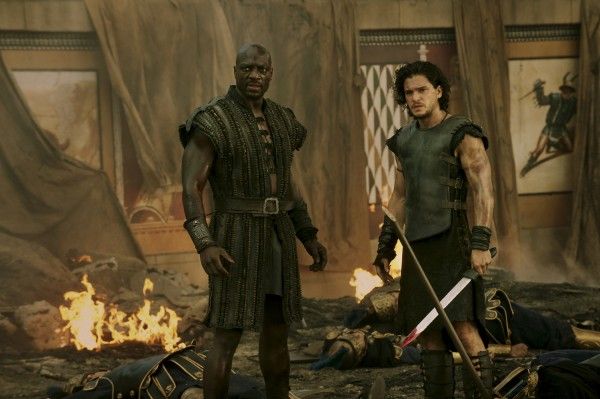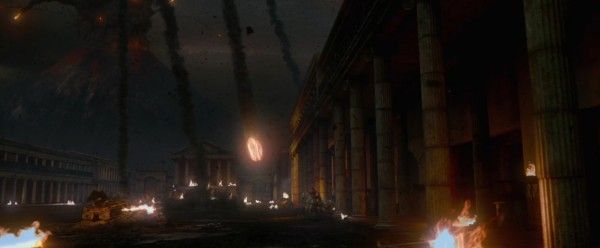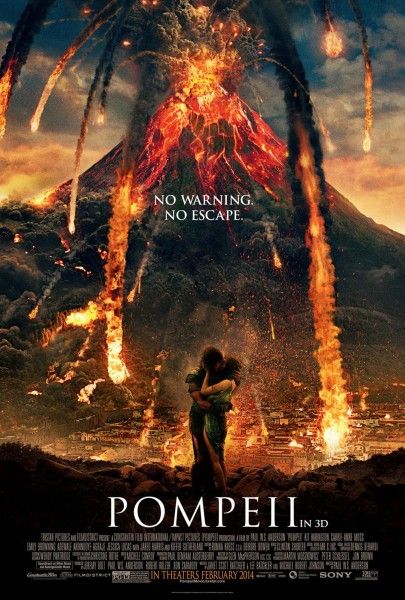Until Titanic was released to record-breaking box office and a slew of awards, director James Cameron was known for straight-up action movies. Titanic is still an action movie; it just happens to have a cheesy love story in the middle, and its epic sweep and central tragedy connected with audiences. Two lesser directors attempted to repeat this formula, but with far less success. Michael Bay attempted it in 2001 with Pearl Harbor and now Paul W.S. Anderson, the director behind Mortal Kombat, Alien vs. Predator, and multiple Resident Evil movies, has tried with Pompeii, a movie that not only apes Titanic, but also Gladiator. Anderson may recognize the formula and have more weapons of destruction at his disposal, but he neither has the skill or the originality to move Pompeii out of the shadow of giants.
In 79 A.D., a volcano erupted near Pompeii, wiping out all the inhabitants, but the ash managed to preserve the bodies and create a haunting tableau of the city's final moments. The film's story begins 17 years early as a young Milo (Dylan Schombing) witnesses his family and fellow Celts cut down by a platoon of Roman soldiers led by the sneering Cal/Commodus Corvus (Kiefer Sutherland). Fast forward to 79 A.D. and now Jack/Maximus Milo (Kit Harington) is a gladiator who mercilessly, unenthusiastically, and easily kills his opponents. He's sent to the resort city of Pompeii where he's matched against fellow and honorable gladiator Juba Atticus (Adewale Akinnuoye-Agbaje) and falls for the wealthy, kind, and beautiful Rose Cassia (Emily Browning). However, Corvus is now a senator who wants to marry Cassia, Atticus is on the verge of earning his freedom, and Milo wants revenge against the man who murdered his people. Everyone's plans go to shit when Mt. Vesuvius erupts and rains hell down on the city.
It's difficult to tell if Anderson had the legitimately grand aspirations as the film's "inspirations" (to put it more than charitably), or if he and the film's four screenwriters made a cynical calculation to simply rip-off what had worked for better movies. This isn't just a broad "Hero's Journey" tale or classic story of doomed love. Those are types. Pompeii is artlessly photocopying characters. It's not enough that the hero befriends a fellow gladiator. That gladiator must come from Africa and be honorable, friendly, wise, and equally skilled at combat. It's not enough that the bad is wealthy and powerful. He has to be venal, psychotic, and cowardly. Pompeii never wants to draw outside the lines, and I'm not sure why. It has absolutely nothing to lose by going its own way.
When it comes to the destruction, Anderson has absolutely no hesitation. That's his comfort zone, and it makes all the dramatic interactions feel even sillier by comparison. There is more craft and care put into landing fireballs than there is towards any of the relationships. The "love story" between Milo and Cassia boils down to "I'm a nice person; you're a nice person." From there, the movie relies entirely on Browning looking helpless and Harington making a face typically reserved for young men on the cover of Tiger Beat.
Eventually, we're just rooting for the volcano to come in. It's not because the characters are unlikable (that would require our emotional investment), but because the story desperately needs a change of pace, and we know this is where Anderson is going to shine. The film goes to Gladiator and Titanic when it comes to the plot, but it has a close relative in 2012 for the destruction. Anderson not only has fireballs, but rampant clouds of ash, chasms to swallow helpless citizens, and even a tidal wave. It's the most fun you're going to get out of a movie where almost no one cracks a joke or more than a half-smile. It's deadly serious business…except when a fireball zeroes in on a single ship.
Even if Anderson genuinely wants to create a tragedy (and in the opening credits, he does a surprisingly good job of conveying that tone), it rests on cheap sentiment and shortcuts. Anderson doesn't have the budget to do anything revolutionary and he doesn't have the script to challenge a predictable narrative. He has some solid cinematography, adequate special effects, occasional bouts of unintended comedy (there's a moment near the end involving a lock-pick that had me howling), but for the most part Pompeii shows it's much easier to destroy than create.
Rating: C-




